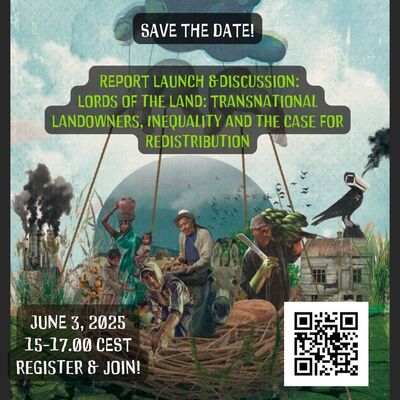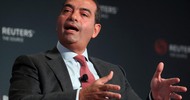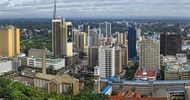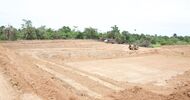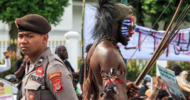The National | July 03. 2008
James Reinl, United Nations Correspondent
UNITED NATIONS // With continued instability from Somalia to Sudan and the controversial re-election of Robert Mugabe as Zimbabwe’s president, this week was not the ideal moment to appeal for more investment in Africa.
International concern over Mr Mugabe dominated the headlines during the African Union summit in Sharm el Sheikh, Egypt, overshadowing a debate on tackling poverty, hunger and disease across the continent with bigger flows of aid and foreign capital.
Unveiling a report at the end of the summit, Jakaya Kikwete, Tanzania’s president and the African Union chairman, said the findings were a “call to action” for “investments in agriculture, education, health and infrastructure”.
“We now need to implement the recommendations to ensure that we halt the spread of hunger, disease and suffering,” he said at the close of the summit on Tuesday.
The report called for targeted investments in agriculture that would spawn a “green revolution” in Africa, along with money to fill “critical gaps” in the continent’s infrastructure and trade networks.
But, coming at a time of widespread concern over Zimbabwe’s leadership, the appeal for foreign capital to flood Africa highlighted an issue that has plagued development economists for decades – high risks deter investment.
Conducting business in Africa continues to be dicey, with war, political instability and “unsatisfactory elections” in Zimbabwe, Nigeria and Kenya among the concerns cited at a Dubai seminar on investing in the continent that was held this week.
The organisers, a consultancy called Control Risks, highlighted such countries as Ghana, Botswana and South Africa as examples with relatively low probabilities of political upheaval; and Chad, the Ivory Coast and Zimbabwe in the high-risk camp.
Their findings echo those of Transparency International, the anti-corruption watchdog, which currently ranks such African nations as Somalia, Sudan and Chad as among the 10 most corrupt countries in the world.
Despite the risks, Africa is not without its advocates. Todd Moss, the US state department’s deputy assistant secretary for African affairs, suggested reasons for confidence in the continent.
“The future of sub-Saharan Africa continues to look brighter as we see a growing number of countries that will reap the benefits of sound economic policy changes, improved governance and new investments in key sectors undertaken over the last decade,” Mr Moss said.
In advance of this month’s forum of the African Growth and Opportunity Act, to be held in Washington, DC, Mr Moss said 41 African countries now traded 65,000 products tax-free with the United States.
“With the continued growth of responsible and representative government in Africa and the recovery from several lengthy conflicts, much of the continent is poised to see robust economic growth and improved living standards,” he said.
In a one-hour documentary released in April, Africa Investment Horizons, Carol Pineau, the producer, showcased money-making opportunities in the continent, including a Ghanaian mutual fund that averages 60 per cent annual returns.
Not all business has been scared away from the region, with global telecommunications companies advancing on Africa’s virgin markets and China’s evident appetite for raw materials. India and Russia also invest huge sums.
Andrew Baukol, the US treasury department’s deputy assistant secretary for Africa and the Middle East, said private-equity flows to sub-Saharan Africa have multiplied by about five times in seven years, valued at US$50 billion (Dh183bn) last year.
Petrodollar windfalls from the oil-rich Gulf may be another boon for developing African economies. Last month, Sultan Ahmad bin Sulayem, the Dubai World chairman, announced a $4bn outlay in tourist resorts in Djibouti, Senegal, Rwanda and South Africa.
In May, Etisalat unveiled plans for overseas expansion, with Mohamed Omran, the company’s chief executive officer, predicting that at least 25 per cent of the company’s revenue would be from Africa by 2012.
With food prices soaring globally, the UAE and Saudi Arabia are cutting deals to buy farmland in Africa and Asia and secure cereals and meat for their populations.
The UN’s Food and Agricultural Organization is expanding its Abu Dhabi office tenfold to broker deals with farmers in such areas as the Horn of Africa.
Gulf firms are also eyeing African commodities, with Qatar Steel last year securing a $375 million stake in an iron ore plant in northern Mauritania and Dubai Aluminium Company spending $3bn on a refinery in the Republic of Guinea.
Marc James, a consultant for Workz Middle East, which helps telecommunications firms set up in Africa, described “serious issues” affecting business in the continent, but said the returns were worth the gamble. “These are emerging markets and they offer huge opportunities. The difference between the actual risk and the perceived risk is where the opportunities lie,” Mr James said.
While Mr James predicts investment from the Gulf and elsewhere will play an ever-increasing role in Africa, other analysts are uncertain whether the continent could be the dream destination for overseas capital.
Nnamdi Madichie, a Nigerian academic due to join the University of Sharjah’s College of Business in September, said Gulf investors were “only toying with” Africa and had yet to make firm commitments.
“The bottom line is security of investments,” Mr Madichie said. “There is the need to put in place an environment that is suitable for business investment. Unless African nations can vouch for the safety of outside investment, investors are not going to go in very large numbers.”
Other pundits question whether foreign investment is likely to improve the lives of everyday Africans, helping to tackle “poverty, hunger and disease” in the spirit outlined at Sharm el Sheikh.
Mr Moss said investment in “railways, roads, ports and airports” will be an infrastructural crutch that will help Africa’s home-grown firms expand and compete globally.
But others, including Eckart Woertz, economics programme manager for the Dubai-based Gulf Research Center, questions whether foreign investment alone can spawn an economic renaissance.
Whether building telephone networks, grain farms or mining facilities, foreign investors are always looking for a “good deal”, Mr Woertz said. “They want to plant food in Africa for their own populations, not for the African population,” he said. “They want fixed commodity prices for their industries. They don’t want to build up the industries in Africa.”
Aside from “a few royalty fees to the government”, Africa’s populations may have nothing to look forward to other than “the environmental problems usually associated with extractive industries and large monocultures”.
“A lot will depend on a balanced approach by Gulf investors, otherwise only a small number may benefit and the larger numbers will still face problems. There needs to be a clear trickle-down effect and the extent of political participation is crucial. “Gulf investors will need to interact with local communities and gain their acceptance, while African governments would need to distribute profits via national development and infrastructure building.”
James Reinl, United Nations Correspondent
UNITED NATIONS // With continued instability from Somalia to Sudan and the controversial re-election of Robert Mugabe as Zimbabwe’s president, this week was not the ideal moment to appeal for more investment in Africa.
International concern over Mr Mugabe dominated the headlines during the African Union summit in Sharm el Sheikh, Egypt, overshadowing a debate on tackling poverty, hunger and disease across the continent with bigger flows of aid and foreign capital.
Unveiling a report at the end of the summit, Jakaya Kikwete, Tanzania’s president and the African Union chairman, said the findings were a “call to action” for “investments in agriculture, education, health and infrastructure”.
“We now need to implement the recommendations to ensure that we halt the spread of hunger, disease and suffering,” he said at the close of the summit on Tuesday.
The report called for targeted investments in agriculture that would spawn a “green revolution” in Africa, along with money to fill “critical gaps” in the continent’s infrastructure and trade networks.
But, coming at a time of widespread concern over Zimbabwe’s leadership, the appeal for foreign capital to flood Africa highlighted an issue that has plagued development economists for decades – high risks deter investment.
Conducting business in Africa continues to be dicey, with war, political instability and “unsatisfactory elections” in Zimbabwe, Nigeria and Kenya among the concerns cited at a Dubai seminar on investing in the continent that was held this week.
The organisers, a consultancy called Control Risks, highlighted such countries as Ghana, Botswana and South Africa as examples with relatively low probabilities of political upheaval; and Chad, the Ivory Coast and Zimbabwe in the high-risk camp.
Their findings echo those of Transparency International, the anti-corruption watchdog, which currently ranks such African nations as Somalia, Sudan and Chad as among the 10 most corrupt countries in the world.
Despite the risks, Africa is not without its advocates. Todd Moss, the US state department’s deputy assistant secretary for African affairs, suggested reasons for confidence in the continent.
“The future of sub-Saharan Africa continues to look brighter as we see a growing number of countries that will reap the benefits of sound economic policy changes, improved governance and new investments in key sectors undertaken over the last decade,” Mr Moss said.
In advance of this month’s forum of the African Growth and Opportunity Act, to be held in Washington, DC, Mr Moss said 41 African countries now traded 65,000 products tax-free with the United States.
“With the continued growth of responsible and representative government in Africa and the recovery from several lengthy conflicts, much of the continent is poised to see robust economic growth and improved living standards,” he said.
In a one-hour documentary released in April, Africa Investment Horizons, Carol Pineau, the producer, showcased money-making opportunities in the continent, including a Ghanaian mutual fund that averages 60 per cent annual returns.
Not all business has been scared away from the region, with global telecommunications companies advancing on Africa’s virgin markets and China’s evident appetite for raw materials. India and Russia also invest huge sums.
Andrew Baukol, the US treasury department’s deputy assistant secretary for Africa and the Middle East, said private-equity flows to sub-Saharan Africa have multiplied by about five times in seven years, valued at US$50 billion (Dh183bn) last year.
Petrodollar windfalls from the oil-rich Gulf may be another boon for developing African economies. Last month, Sultan Ahmad bin Sulayem, the Dubai World chairman, announced a $4bn outlay in tourist resorts in Djibouti, Senegal, Rwanda and South Africa.
In May, Etisalat unveiled plans for overseas expansion, with Mohamed Omran, the company’s chief executive officer, predicting that at least 25 per cent of the company’s revenue would be from Africa by 2012.
With food prices soaring globally, the UAE and Saudi Arabia are cutting deals to buy farmland in Africa and Asia and secure cereals and meat for their populations.
The UN’s Food and Agricultural Organization is expanding its Abu Dhabi office tenfold to broker deals with farmers in such areas as the Horn of Africa.
Gulf firms are also eyeing African commodities, with Qatar Steel last year securing a $375 million stake in an iron ore plant in northern Mauritania and Dubai Aluminium Company spending $3bn on a refinery in the Republic of Guinea.
Marc James, a consultant for Workz Middle East, which helps telecommunications firms set up in Africa, described “serious issues” affecting business in the continent, but said the returns were worth the gamble. “These are emerging markets and they offer huge opportunities. The difference between the actual risk and the perceived risk is where the opportunities lie,” Mr James said.
While Mr James predicts investment from the Gulf and elsewhere will play an ever-increasing role in Africa, other analysts are uncertain whether the continent could be the dream destination for overseas capital.
Nnamdi Madichie, a Nigerian academic due to join the University of Sharjah’s College of Business in September, said Gulf investors were “only toying with” Africa and had yet to make firm commitments.
“The bottom line is security of investments,” Mr Madichie said. “There is the need to put in place an environment that is suitable for business investment. Unless African nations can vouch for the safety of outside investment, investors are not going to go in very large numbers.”
Other pundits question whether foreign investment is likely to improve the lives of everyday Africans, helping to tackle “poverty, hunger and disease” in the spirit outlined at Sharm el Sheikh.
Mr Moss said investment in “railways, roads, ports and airports” will be an infrastructural crutch that will help Africa’s home-grown firms expand and compete globally.
But others, including Eckart Woertz, economics programme manager for the Dubai-based Gulf Research Center, questions whether foreign investment alone can spawn an economic renaissance.
Whether building telephone networks, grain farms or mining facilities, foreign investors are always looking for a “good deal”, Mr Woertz said. “They want to plant food in Africa for their own populations, not for the African population,” he said. “They want fixed commodity prices for their industries. They don’t want to build up the industries in Africa.”
Aside from “a few royalty fees to the government”, Africa’s populations may have nothing to look forward to other than “the environmental problems usually associated with extractive industries and large monocultures”.
“A lot will depend on a balanced approach by Gulf investors, otherwise only a small number may benefit and the larger numbers will still face problems. There needs to be a clear trickle-down effect and the extent of political participation is crucial. “Gulf investors will need to interact with local communities and gain their acceptance, while African governments would need to distribute profits via national development and infrastructure building.”


